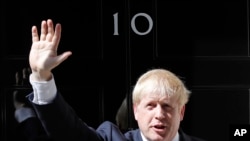Story updated at 6:41 am.
British Prime Minister Boris Johnson is trying to pressure the European Union to give ground on Brexit by intensifying preparations for the U.K. to leave the bloc in three months without a divorce deal.
As the government's new "no-deal" crisis committee met Monday, businesses warned that there is no way to prevent economic damage if Britain crashes out of the 28-nation trading bloc without clarity about future relations.
The Confederation of British Industry, the country's biggest business lobby group, said neither the U.K. nor the EU is prepared for a no-deal Brexit.
The CBI made 200 recommendations for both sides to accelerate Brexit preparations, including new laws, new IT systems and agreements to temporarily maintain some common regulations.
But it said "the unprecedented nature of Brexit means some aspects cannot be mitigated."
"It's like putting sandbags down for a flood. Your kitchen's still going to be underwater but maybe we can save the bedrooms upstairs," said the group's head of EU negotiations, Nicole Sykes.
Another warning came from French automaker PSA, which said it could move production of its Vauxhall Astra model out of Britain if Brexit makes it unprofitable. Chief executive Carlos Tavares told the Financial Times that would mean closing Vauxhall's Ellesmere Port plant in Wales, which employs 1,000 people.
Johnson became prime minister last week after winning a Conservative Party leadership contest by promising that the U.K. will leave the EU on the scheduled date of Oct. 31, with or without a divorce deal.
The EU struck a withdrawal agreement with Johnson's predecessor, Theresa May, but it was rejected by Britain's Parliament. Johnson is insisting the bloc make major changes to May's spurned deal, including scrapping an insurance policy for the Irish border that has been rejected by U.K. lawmakers.
"We'll keep straining every sinew if there is a deal to be done, but the EU will need to move and, if they don't, it is incredibly important that we are ready for eventualities," Foreign Secretary Dominic Raab said Monday.
The EU says it won't reopen negotiations on the deal or remove the border "backstop."
Economists warn that leaving the bloc without an agreement on terms would disrupt trade by imposing tariffs and customs checks between Britain and the bloc. The British government's financial watchdog says that could send the value of the pound plummeting and push the U.K. into recession.
Johnson, contradicting the opinion of most experts, has said leaving without a divorce deal will be "vanishingly inexpensive" if Britain is properly prepared.
He says he will "turbo-charge" plans for a no-deal Brexit — including beefed-up border measures and a multimillion-pound (-dollar) information campaign for individuals and businesses — and has set up a high-level "exit strategy committee" to oversee preparations.
But he faces strong resistance from Parliament, which opposes a no-deal Brexit.
On Monday, Johnson was visiting Scotland, where his plans also face heavy resistance. While the U.K. as a whole voted to leave the EU in 2016, Scotland backed remaining by a large margin.
First Minister Nicola Sturgeon, who leads the semi-autonomous Edinburgh-based government, says Scotland should hold a vote on independence from the U.K. if it is dragged out of the EU against its will.
Scottish Conservative leader Ruth Davidson opposes independence but also says she won't support leaving the EU without an agreement.
"I don't think the government should pursue a no-deal Brexit, and, if it comes to it, I won't support it," she wrote in the Scottish Mail on Sunday.




